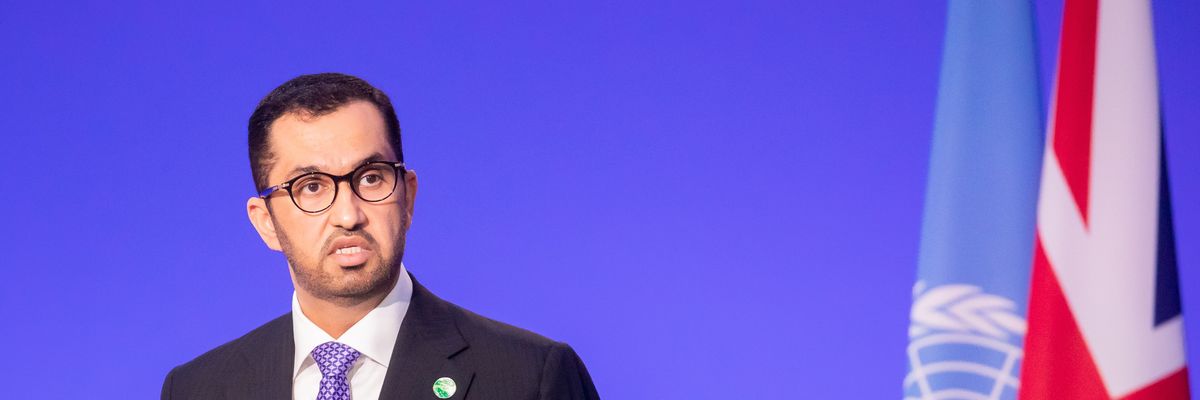With six months to go until the 2023 United Nations Climate Change Conference, or COP28, is set to take place in Dubai, comments by the designated president of the summit about his approach to mitigating the climate crisis are already setting off alarm bells with critics including former United Nations climate chief Christiana Figueres.
As The Guardian reported Tuesday, Figueres addressed in a recent episode of her podcast, "Outrage and Optimism," a speech given earlier this month by Sultan al-Jaber, the CEO of Abu Dhabi National Oil Company (ADNOC), whose appointment as president of COP28 sparked outrage among climate campaigners in January.
In comments Figueres described as "very worrisome," al-Jaber said at the Petersburg Climate Dialogue in Berlin that policymakers should focus on drawing down "fossil fuel emissions"—but not the extraction of fossil fuels themselves.
"We must be laser focused on phasing out fossil fuel emissions, while phasing up viable, affordable zero carbon alternatives," said al-Jaber, adding that "smart government regulation to... make carbon capture commercially viable" is needed.
Figueres, former executive secretary of the U.N. Framework Convention on Climate Change, said al-Jaber was suggesting COP28 will support carbon capture and storage (CCS) technology—an unproven method of removing carbon emissions from smokestacks at power plants, which has failed in at least two high-profile projects in the United States and which climate campaigners say only serves as a distraction from genuine solutions to the climate emergency–eliminating the extraction of fossil fuels and transitioning to renewable energy.
"He is trying to say: 'Look, those of us who are producers of fossil fuels will be responsible for our emissions through enhanced carbon capture and storage. And we, or the COP presidency, will also support the zero carbon alternatives,'" said Figueres.
She added that dozens of countries have pushed for far-reaching commitments at previous global climate summits, with small island nations on the frontlines of the climate crisis joined by several countries in the Global North at last year's COP27 in unsuccessfully pushing for an agreement that called for a "phase-out" of fossil fuels instead of a "phase-down."
Al-Jaber's endorsement of a position embraced by fossil fuel companies like the one he heads is "very dangerous," said Figueres. "I just don't see most countries, and certainly not the vulnerable countries, being willing to support the COP president on this because it is a direct threat to their survival."
Instead of investing in CCS—which companies have poured billions of dollars into over the last several years with no success stories to show for it, as U.S. watchdog Food & Water Watch said this week—scientists have warned that policymakers must slash carbon emissions by 45% by 2030 in order to limit global heating to 1.5°C.
"We do not have CCS commercially available and viable over the next five to seven years," Figueres said. "It's just not going to happen."
While CCS costs an estimated $50 to $200 per tonne of carbon dioxide, according to the Intergovernmental Panel on Climate Change, energy experts agreed in a U.N. report released in 2021 that investing in renewable energy sources would save $55 billion in a year.
As one European official toldClimate Home News this month, CCS is currently a "luxury technology" that is currently being promoted mainly by "fossil exporting countries," while renewable energy sources "are the most affordable and readily available mitigation technologies."
Al-Jaber has been joined by United Arab Emirates Environment Minister Mariam bint Mohammed Almheiriin attempting to tamp down expectations that COP28 will yield far-reaching action to draw down the use of fossil fuels, as scientists have demanded.
In February, Almheiri said at the Munich Security Conference that "we need the oil and gas sector to be with us," while saying the industry should "phase out oil and gas in a just way."
Journalist Khaled Diab said after al-Jaber's comments this month that "this is what happens when a petrostate and an oil executive lead global climate talks."
"When you are the president of the COP," said Figueres, "you cannot put forward the position of the country that you're coming from."
